Resortecs x Sioen: The start of a European consortium for workwear textile waste management
Resortecs, a leader in textile eco-design and end-of-life waste management, partners with Sioen, a global leader in technical textiles and protective clothing, to create workwear that combines durability with circularity. This collaboration is a major milestone in developing workwear that meets the highest safety standards while being designed for disassembly and recycling at the end of its lifecycle.
Under the agreement, Sioen will be integrating Resortecs’ Smart Stitch™ heat-dissolvable threads into its workwear production. This enables the creation of eco-designed garments that can be efficiently disassembled and recycled without compromising quality, comfort, nor protective functionality. Resortecs, on the other hand, will offer its comprehensive textile waste management service, that includes the disassembly and sorting of the discarded and returned textile products, as well as facilitating the recycling of the sorted textile materials.
Bart Vervaecke, CEO of Sioen’s Protective Clothing division, commented:
“Sioen together with Resortecs makes a big step in ready-to-dismantle garments with this cooperation. We are proud that with our support we can enable Resortecs to install their EU-based disassembly line. Resortecs’ technology will play an important role as a fully integrated part of our sustainable strategy at Sioen, drastically improving the end of life solution for our garments.”
The beginning of a textile waste management circularity consortium in Europe
This collaboration lays the foundations of a Resortecs-led consortium in the Benelux and France regions for end-of-life textile waste management of workwear. The consortium will unite the efforts of workwear manufacturers, recyclers, government agencies, and Resortecs, to facilitate an operationally optimised and financially viable circular textile waste-management solution for complex apparel.
At the heart of the consortium is a Smart Disassembly™ line, with an annual processing capacity of 3000 tons, that will be placed and operated in Belgium by Resortecs by the end of 2025. The Smart Disassembly™ pre-processing line will integrate with existing sorting and collection infrastructure, as well as current and upcoming recycling technologies.
Resortecs’s holistic waste management solution uses an innovative technology to solve a critical challenge in textile recycling. By automatically eliminating trims that block recycling and reclaiming double the amount of a product’s textile content, up to 15x faster, Resortecs facilitates circularity on an industrial scale. As a result, high-performance workwear, along with other textile products like mattress covers and fashion garments, can now be disassembled and recycled more effectively.
Workwear manufacturers operating in Belgium, Netherlands, Luxembourg and/or France can now take part in the consortium by simply producing their textile products with the heat-dissolvable Smart Stitch™ sewing threads. Once those textile products have reached their end-of-life, they are delivered to Resortecs for disassembly, sorting, and recycling. Get in touch to learn more.
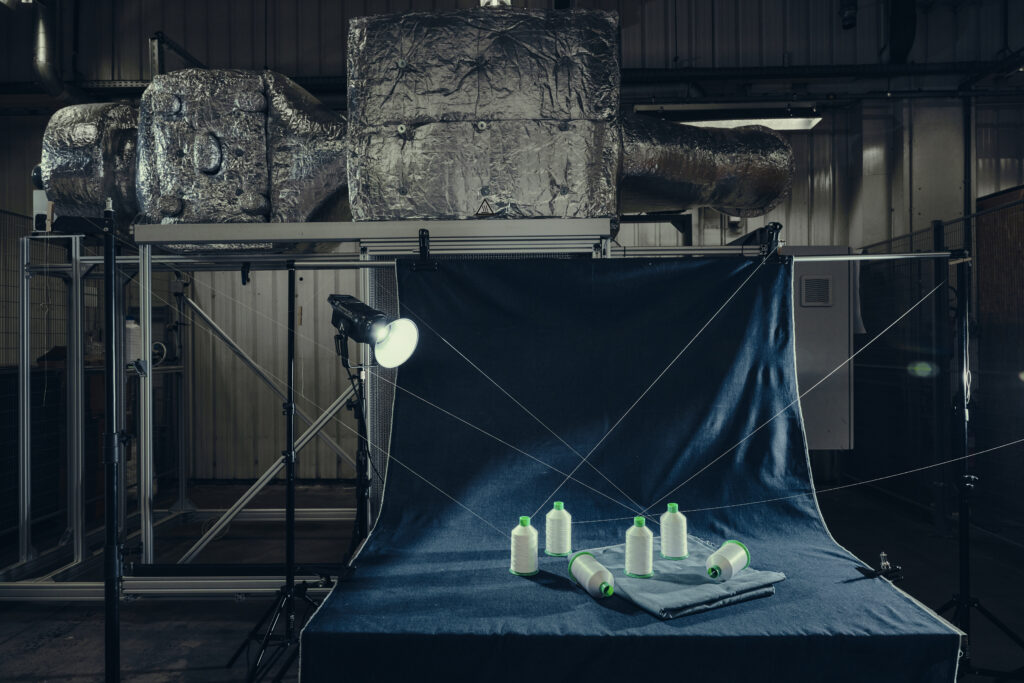
A new circular standard for protective textiles
This collaboration marks a crucial step towards setting circularity as the new standard in the protective clothing and technical textiles sectors, with the goal of producing over half a million of fully recyclable garments with Sioen in the coming 3 years.
Cédric Vanhoeck, CEO and co-founder of Resortecs, commented:
“As we drive circularity in protective textiles, we’re challenging industry norms. Many believe that circular design can’t align with safety standards, but we’re proving otherwise.This collaboration shows how innovation is key in the sector for building a more sustainable future without technical compromises.”
By combining Sioen’s expertise in protective gear with Resortecs’ cutting-edge Design-for-Disassembly technology, the partnership is setting a precedent for workwear that protects both workers and the environment.
“It’s galvanising to see one of the biggest workwear players in Europe supporting our efforts in creating a pan-European network of disassembly and pre-processing infrastructure. We are actively looking for other market leaders in other European regions such as DACH, Iberian Peninsula, and Scandinavia with whom we share the same vision in rejuvenating the European textile industry”, added Cédric Vanhoeck.
About Resortecs
Resortecs® offers pre- and post-consumer textile waste management services for the fashion, workwear, bedding and automotive industry. The company offers heat-dissolvable stitching threads (Smart Stitch™) and thermal disassembly systems (Smart Disassembly™) that enable easy, automated textile recycling on an industrial scale. Resortecs’ mission is to lead the textile industry towards full circularity by facilitating Design-for-Disassembly (DFD).
About Sioen
Sioen is a global leader in technical textiles, colouring solutions and protective clothing, providing high-performance solutions for a wide range of industries, including workwear, firefighting, military, and forestry. Dedicated to innovation, Sioen combines advanced materials and cutting-edge designs to ensure maximum safety and durability, all while striving to promote sustainability through the development of circular products.
More information about Sioen can be found online at: https://sioen.com/en
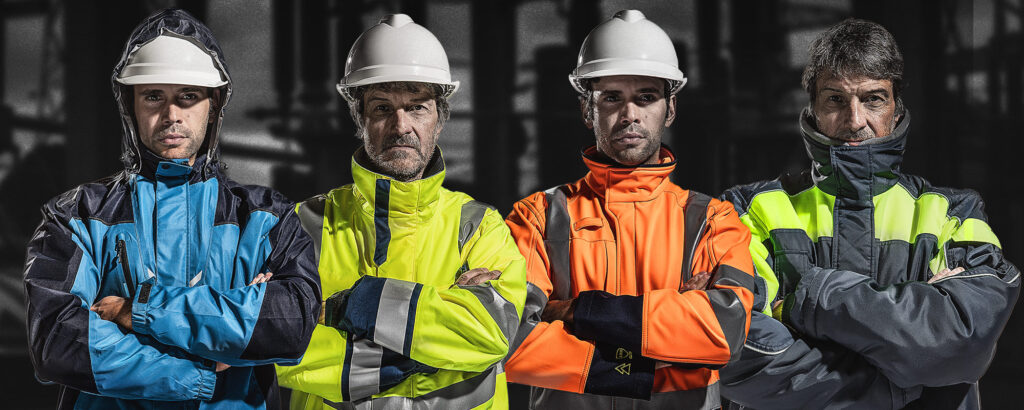
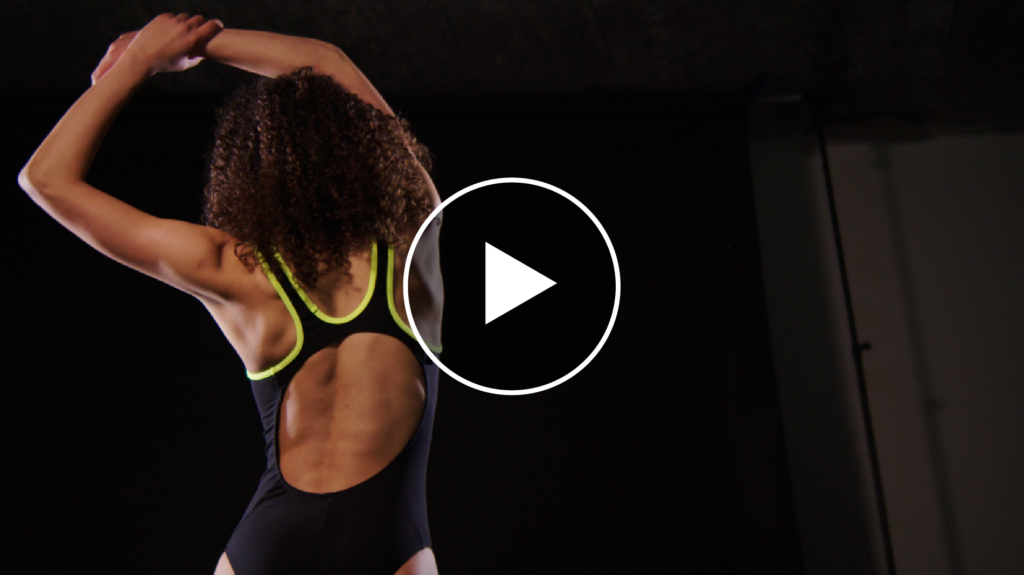
Resortecs has joined forces with Decathlon, the global leader in sports equipment and apparel, to develop a fully recyclable swimwear collection without compromising performance, functionality, or aesthetics. This collaboration blends state-of-the-art technology with high-performance design.
Acerina Trejo Machin, the Chief Technology Officer at Resortecs, explains, “We all know that a high percentage of elastane prohibits the recycling of fabrics, but eliminating elastane lowers the functionality and performance of a garment. To balance performance and recyclability, Decathlon developed Negombo, a fabric ensuring elasticity without the use of elastane.”
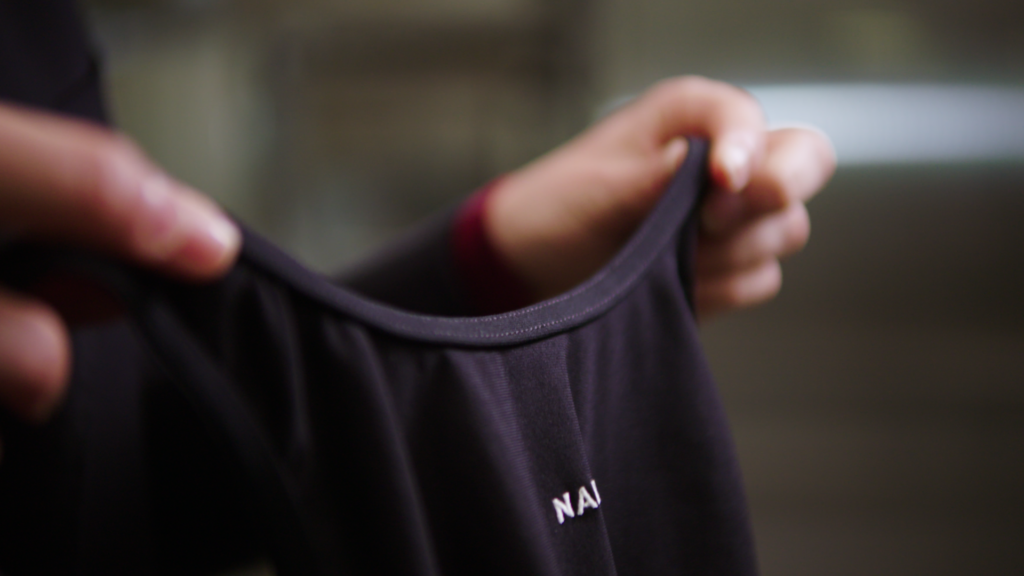
However, creating a swimwear garment with a recyclable fabric alone isn’t enough to meet the required performance and comfort, for which elastic bands are needed. Those elastic bands are not processable by recyclers and block the recycling of the swimwear. This is where Resortecs comes into play. Resortecs’ Smart Stitch™, combined with Smart Disassembly™, enables the efficient separation of the elastic bands from the main fabric at the end of the garment’s life cycle.
Acerina elaborates, “Resortecs’ active disassembly process ensures the maximum recyclability rate of the swimwear garment. Our technology allows for fully automatic disassembly, without any manual intervention, at a scale of up to 10 tons a day. This results in an impressive 63% increase in material recovery and is 10 times faster than conventional methods.”
The synergy between Resortecs and Decathlon allows for the creation of swimwear that is not only high-performing but also fully recyclable, without making any compromises in design, durability, or comfort.
Closing the loop has never been easier. By incorporating Resortecs’ disassembly solution, product designers can ensure circularity while focusing on their ultimate goal: creating garments that best fit their customer needs.
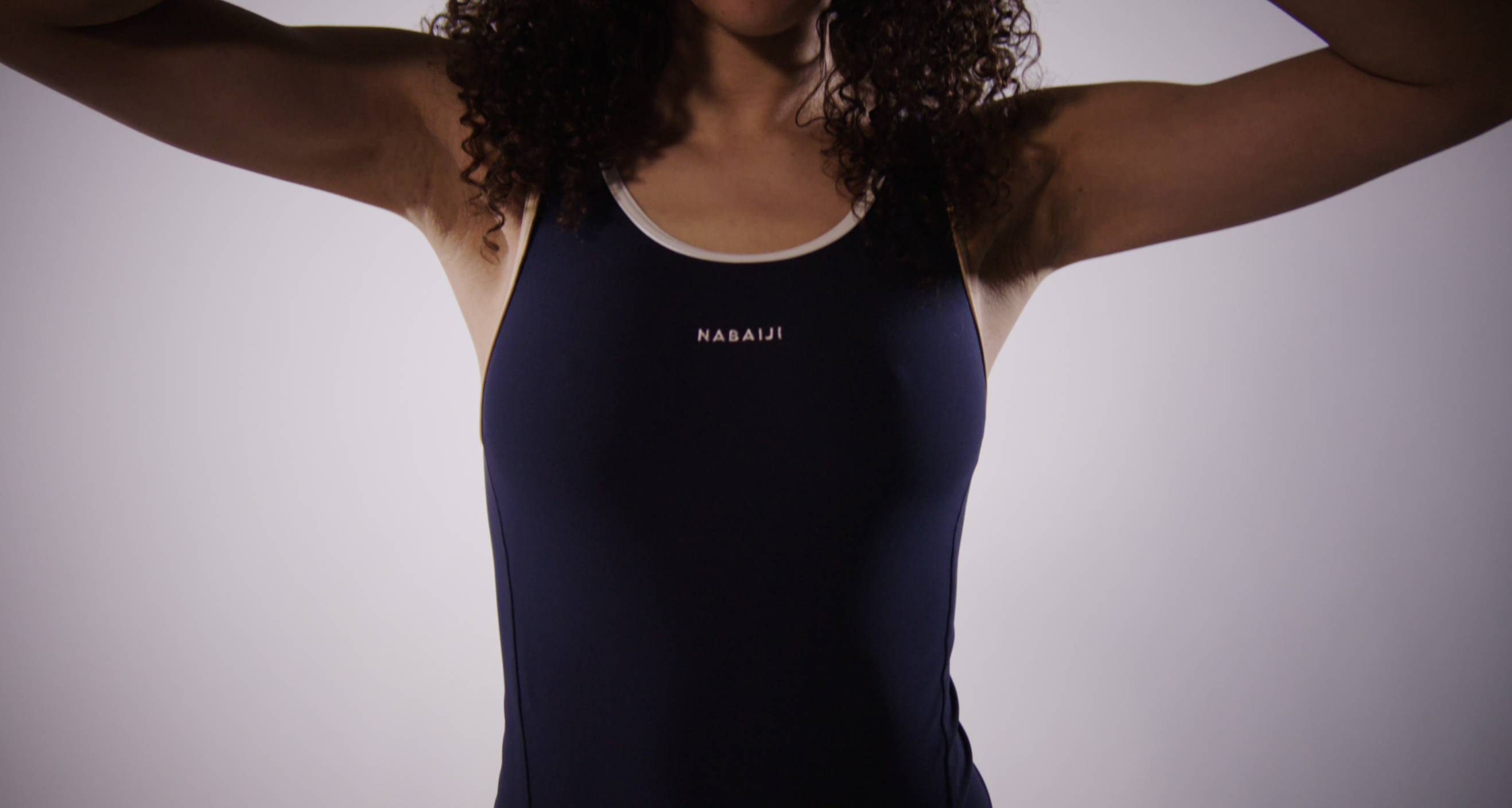
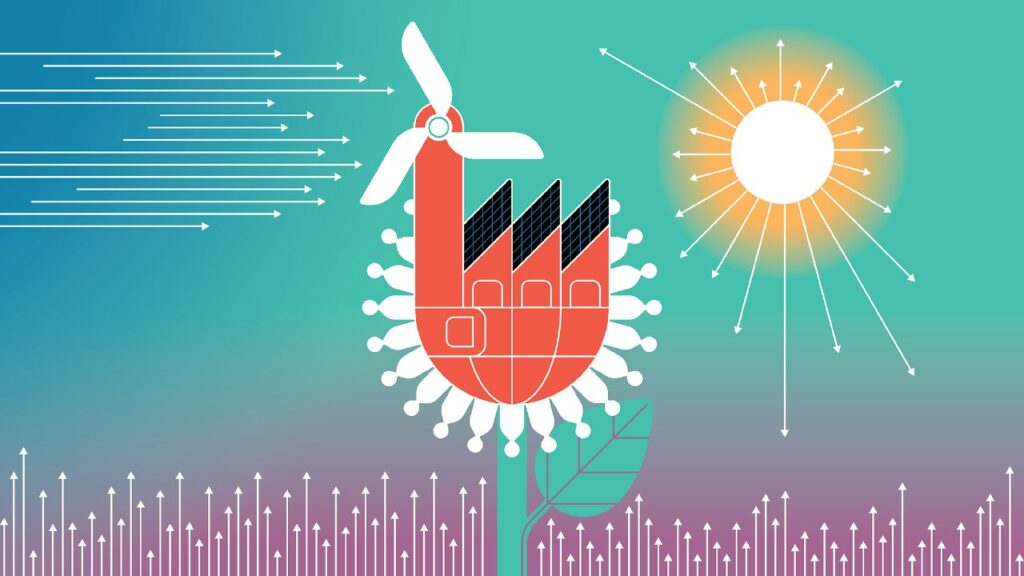
©Filip Ysenbaert
De Tijd and its French-speaking counterpart L’Echo have proudly unveiled their esteemed selection of 30 Belgian companies leading the charge in combating climate change. Under the banner of “Changemakers,” this initiative celebrates organizations showcasing exemplary commitment and innovation in environmental stewardship. Among these distinguished nominees stands Resortecs, alongside other strong innovators like Purfi, Renewi, and Protealis.
The Changemakers initiative aims to spotlight companies that excel in leveraging technology, products, services, or business models to tackle climate change and protect the environment. Acknowledging the pressing need for collective action, De Tijd and L’Echo underscore the pivotal role of businesses in addressing this global challenge.
The nominated companies represent diverse sectors, including energy, software, construction, food, textiles, waste management, and recycling.
“Climate change stands as one of the most critical economic and societal challenges of our era,” states Isabel Albers, Editor-in-Chief of De Tijd and L’Echo. “We firmly believe that the innovative spirit and entrepreneurial drive of our companies are essential in tackling these challenges.”
Under the guidance of environmental economics professor Steven Van Passel from the University of Antwerp, a professional jury will select two standout companies – one startup and one established enterprise – as the ultimate Changemakers. Additionally, De Tijd and L’Echo subscribers will have the opportunity to cast their votes for their preferred Changemaker.
The distinguished jury panel includes industry luminaries and experts such as Julie Lietaer (European Spinning Group), Piet Colruyt (Impact House), Ignace Schops (Bond Beter Leefmilieu), Bertrand Piccard (Solar Impulse), Stéphanie Fellen (Smart2circle), François Gemenne (University of Liège), and Julien Pestiaux (Climact).
Voting for the Changemaker awards is now open to subscribers, with the winners set to be announced on March 12.
For more information about the Changemakers initiative and to cast your vote, visit Changemakers.be and tijd.be.
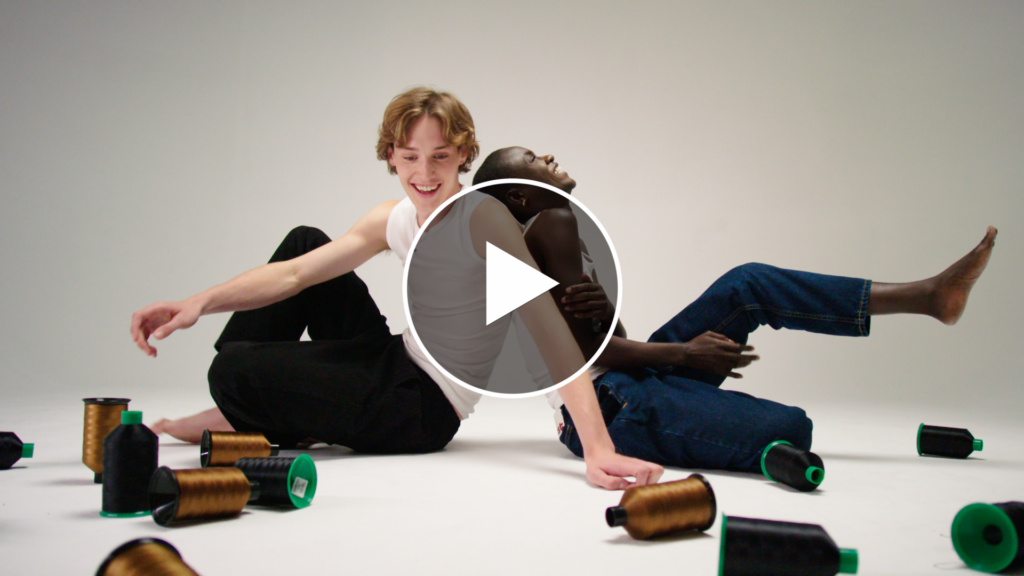
HNST Studio, the Antwerp-based label dedicated to creating jeans that embody transparency and circularity, partners with Belgian eco-design innovator Resortecs to launch new products made to be unmade—easy to disassemble for repair and recycling at the end of life.
The partnership debuts with the newly introduced Geri (for women) and Simon (for men) pants: crafted with up to 70% recycled cotton, these are HNST’s first jeans to feature an elastic waistband and drawstrings for unparalleled day-to-day comfort and flexibility.
Completely eco-designed for recycling, the jeans’ waistbands are stitched using Resortecs’ Smart Stitch™, an award-winning thread engineered to disappear under heat. This thread change at the design phase ensures that the jeans can be disassembled without manual intervention at the end of their lifecycle—allowing for their recyclable fabric to be automatically sorted out of the non-recyclable materials added to the waistband for more comfort.

“Our other jeans didn’t have elastic waistbands because they would be critical blockers for recycling. Collaborating with Resortecs allowed us to explore new possibilities to give our customers more comfort without compromising our non-negotiable commitment to circularity” stated Eva Engelen, Sustainability and Product Manager at HNST.
“We are two Belgian innovators trying to rewrite the future of fashion in a circular way,” said Cédric Vanhoeck, CEO at Resortecs. “This partnership with HNST showcases how our technology can unlock new possibilities for fashion players that want to design for recycling while keeping the creativity, functionality, and quality of their products”, he added.
The Simon and Geri pants are just the first drop of the HNST x Resortecs partnership. Both companies are committed to further integrating Resortecs’ design-for-disassembly solutions into other HNST designs, solidifying their shared vision of establishing circularity as the standard in the fashion industry. Consumers everywhere can now shop the collection at letsbehonest.eu and at select independent retailers in Europe, North America, and Japan.
Resortecs is one of the 13 winners of the Make it Circular Challenge!
On May 3, the 13 winners of the Make it Circular Challenge were announced. A total of 650 circular initiatives from over 20 different countries participated in the highly competitive challenge organized by the IKEA Foundation and What Design Can Do.
According to the challenge’s international jury, Smart Stitch™ and Smart Disassembly™ “represent the very best of design innovation and have the potential to make a significant impact in promoting sustainability and circularity.”
The Make it Circular Challenge
The competition was launched last year by WDCD and the IKEA Foundation to identify and support some of the world’s most promising circular innovations and enterprises. From hundreds of entries worldwide, 13 exciting visions for a restorative and regenerative future were selected, from seaweed packaging to waste-based textiles and upcycling marketplaces.
In addition to a €10.000 prize fund, the winners of the Make it Circular Challenge will have access to a six-month-long development program. The program was co-created by experts from the global Impact Hub network, providing the winning teams with the expert mentorship, guidance, and tools they need to grow their businesses and expand their impact on the world. The International Jury, consisting of 11 influential figures in circular design and entrepreneurship, including Bas van Abel (Fairphone), Corinne Gray (Unreasonable Group), Arthur Huang (Miniwiz), and Tamara Streefland (Built By Nature), was responsible for determining which of the 50 nominees had the most potential and would best benefit from this development program.
Selected by Secrid
Resortecs is also one of the three special projects to receive additional press and assistance. Secrid, a carbon neutral wallet producer, has chosen the 3 winning projects as part of their Impact Fund program, pledging to devote 1% of its revenue to bringing together designers and supporting their efforts to create products that enhance the planet’s natural and social equilibrium. By supporting Resortecs, Secrid aims to accelerate the development of the next generation of designers and promote change in our industries.

Resortecs, Tomorrowland, Paul Bowens, and Amandine David are the big winners of the Henry van de Velde Awards 2023 !
On Tuesday evening, February 7, all winners of the Henry van de Velde Awards received their coveted prize at Bozar in Brussels. In addition to the announcement of who won gold, silver and bronze within the 9 project categories, the winners of the 4 main prizes and the Public Award were also announced.
The jury of the Henry van de Velde Awards, one of the largest award ceremonies in Belgium, “believes in the impact and growth of the company and hopes that their innovative developments will now also find their way into the design world,” according to the statement about the award ceremony.
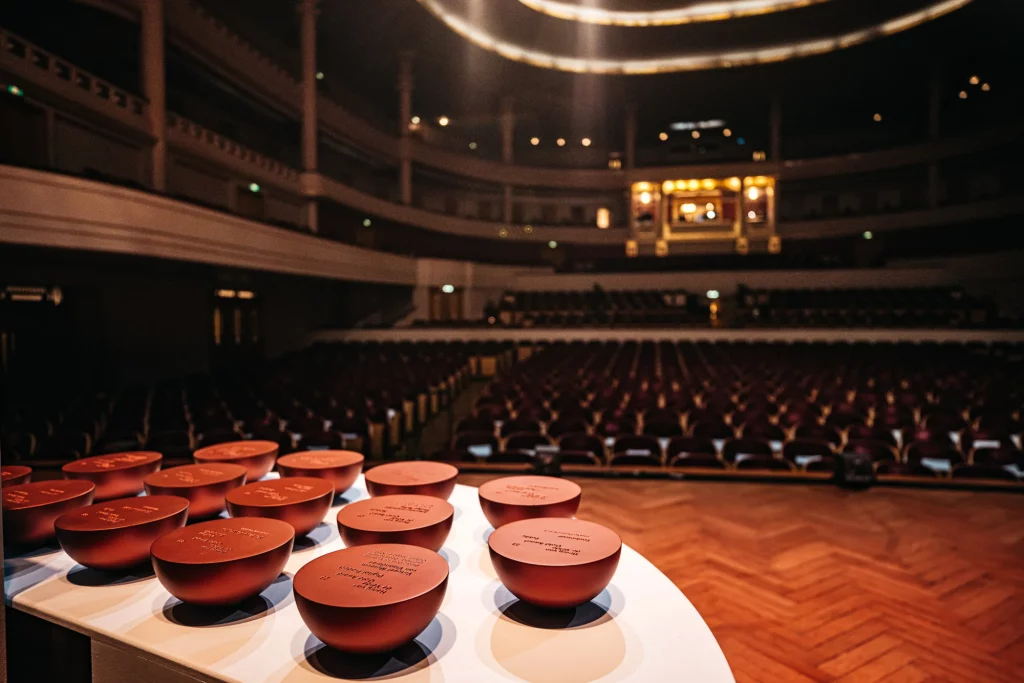
Henry van de Velde Award for Resortecs
The Henry van de Velde Awards are often referred to as the Oscars of design in Flanders. They are the oldest (this year is the 29th edition), best known and most prestigious design awards in Belgium. Winning an award, therefore, opens many doors, at home and abroad. The awards are organized annually by Flanders DC, but the selection of the winners is always done by a carefully composed jury. In addition to chairman Chris Baelus, members of the jury this year included Herman Konings, Katrien Laporte, Max Borka, Elien Haentjens, Ronald Bastiaens and Siegrid Demyttenaere.
Resortecs was considered by the jury a role model in applying the principles of ecodesign. In 2021, Resortecs was also crowned Changemaker of the Year at the Belgian Fashion Awards.
Other parties from the fashion and textile industry can be found among the other winners of the Henry van de Velde Awards. For example, Amandine David received the Young Talent Award. David specializes in traditional crafts such as weaving and pottery in combination with digital production. MyBlanket won Gold in the Consumer Awards category for a rain cover that wheelchair users can attach over their legs without assistance or standing up. No Time To Waste won the Design Research Awards category, which uses fluff, a by-product of the textile industry, and explores its possibilities.

The Henry van de Velde Awards are organized annually in Flanders DC and were made possible thanks to the support of the Flemish Agency for Innovation & Entrepreneurship (VLAIO), Bozar, Z33, the Public Waste Agency of Flanders (OVAM), the Flemish Environment Agency (VMM) and Bokrijk.
More information via https://www.henryvandevelde.be/
We are looking for our next Development Engineer, are you the one?
Are you a driven Engineer with an experience in product / mechanical systems development?
If you are passionate about the circular economy, textiles, and technology, this is your opportunity to join a startup leading the clean-tech revolution that will shape the future of fashion!
Check the full job description and apply via the link below:
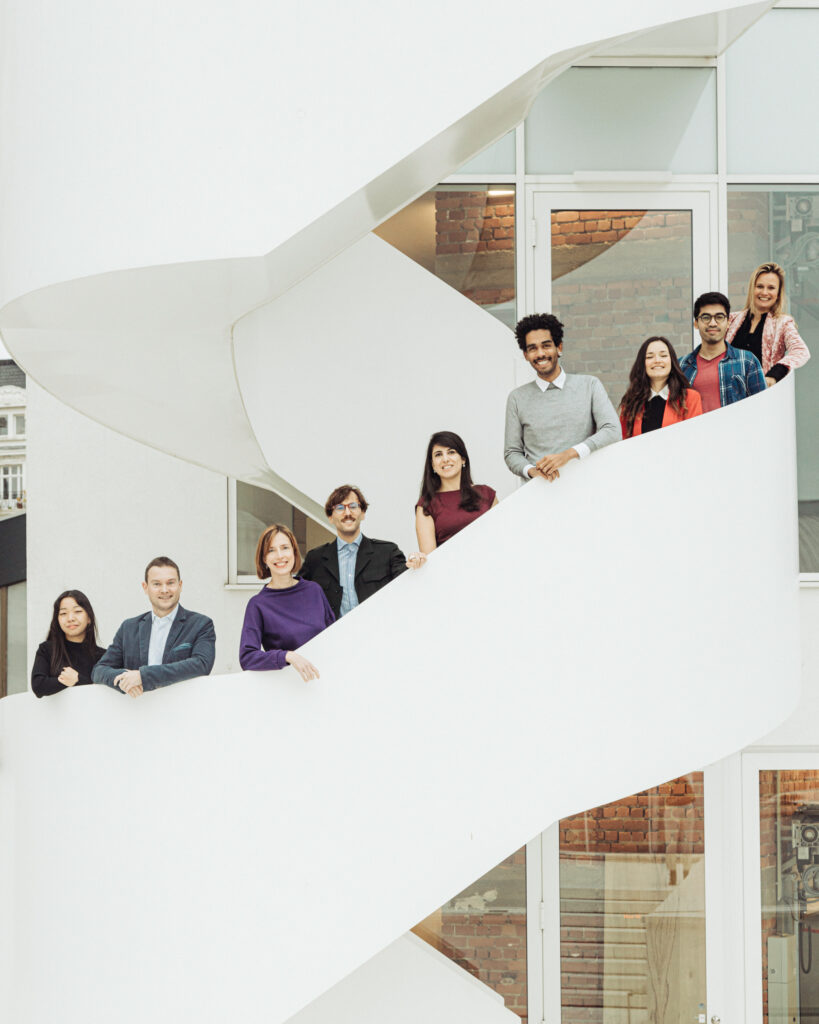
You will be joining a dynamic and challenging start-up environment! Resortecs is a small and driven international team that is leading the transition towards the circular economy.
This is your opportunity to have huge personal and professional growth. This position has substantial responsibilities, networking opportunities and rapid-progress learning in an innovative atmosphere.
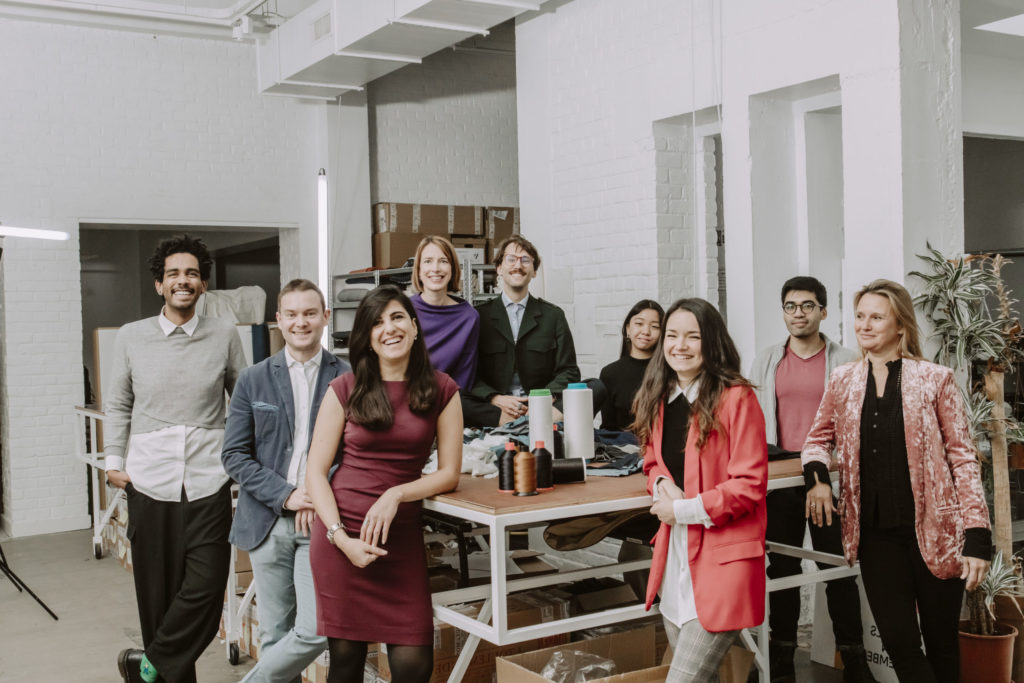
Resortecs strives to grow an inclusive environment, where individual differences are recognized, respected, and responded to in every possible way that makes our people thrive. That’s why all applicants are given equal opportunity regardless of age, gender identity or expression, ethnic origin, nationality, language, disability, religion, socio-economic status, or sexual orientation. Each employee’s distinctive experiences, perspectives, and viewpoints help us build a more resilient, fun, and innovative future for fashion.
Are you the Innovation Engineer we are looking for?
Are you a driven Engineer with a strong interest in generating knowledge from experimentation?
If you are passionate about the circular economy, textiles, and technology, this is your opportunity to join a startup leading the clean-tech revolution that will shape the future of fashion!
Check the full job description and apply via the links below:

You will be joining a dynamic and challenging start-up environment! Resortecs is a small and driven international team that is leading the transition towards the circular economy.
This is your opportunity to have huge personal and professional growth. This position has substantial responsibilities, networking opportunities and rapid-progress learning in an innovative atmosphere.

Resortecs strives to grow an inclusive environment, where individual differences are recognized, respected, and responded to in every possible way that makes our people thrive. That’s why all applicants are given equal opportunity regardless of age, gender identity or expression, ethnic origin, nationality, language, disability, religion, socio-economic status, or sexual orientation. Each employee’s distinctive experiences, perspectives, and viewpoints help us build a more resilient, fun, and innovative future for fashion.
By Rawaa Ammar, Impact & Sustainability Lead at Resortecs.
What do floods caused by extreme rain in Brazil, a heatwave hitting Antarctica, and heavy thunderstorms engulfing Brussels in May have in common? These are only but a subtle sign that climate change is an imminent threat, and that we need to act now.
Observing the water cycle and following how it evaporates into the atmosphere, condenses into rain, and flows back into the sea is an ideal example of how Nature is relying on circularity to sustain life on Earth. To understand such cycles, scientists have always relied on certain parameters throughout the different stages of their formation. The same concept is applied in Life Cycle Assessment studies (LCA), one of my go-to resources to measure impact as a Sustainability & Impact Lead at Resortecs.
An LCA is an environmental management tool that provides a better understanding of a product’s impact on the planet at each stage of its life cycle. It is a very strong tool that can be misused if misconducted. A recent Forbes article explains why environmental impact assessments could potentially undermine sustainable fashion. But does that mean we need to stop conducting LCAs to verify a product’s environmental footprint (PEF)? How will we get the information, and how can brands be held accountable for their sustainability claims?
LCAs should be especially important for the fashion sector, one of the top polluting industries, responsible for 1.2 billion tons of CO2 equivalent every year.
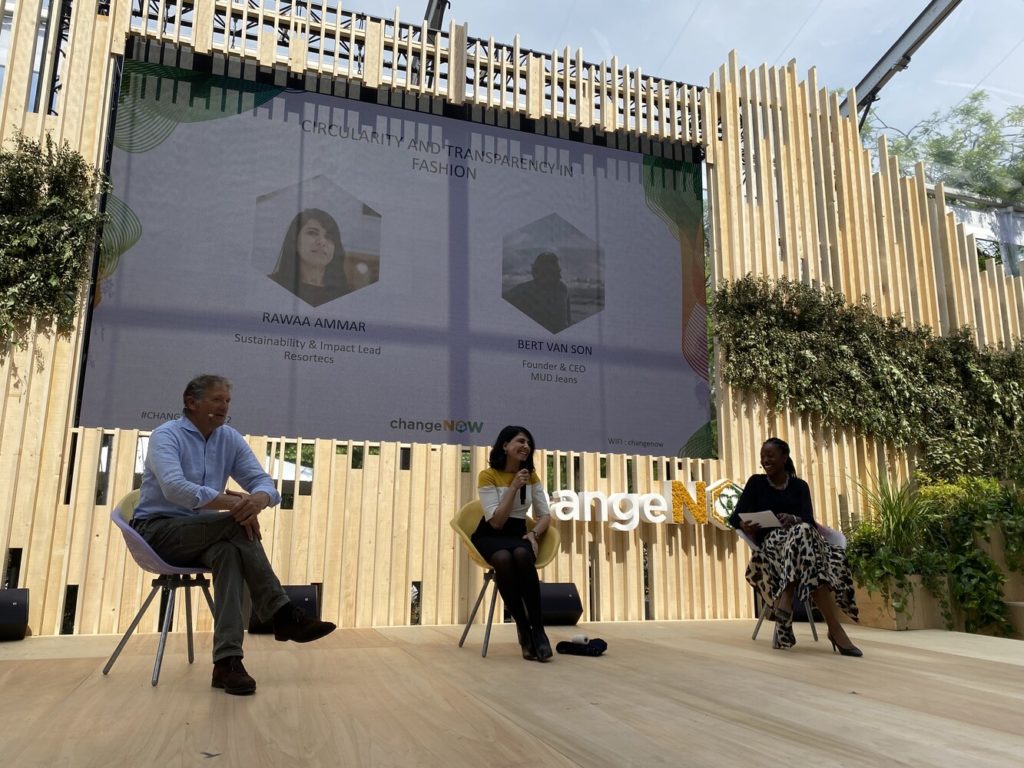
Two weeks ago, I had the opportunity to touch on this topic during a ChangeNow panel discussion on circularity in the fashion industry. The one thing we all agreed on is the critical need for more transparency and information on all things fashion. Data holds great power and framing scientific findings as an LCA can provide brands, legislators, investors, and end-consumers with vital information on the PEF of any product in our closet or shopping cart. LCAs should be especially important for the fashion sector, one of the top polluting industries, responsible for 1.2 billion tons of CO2 equivalent every year.
Concretely speaking, however, the question remains: what kind of change(s) must the fashion industry adopt to help keep the global temperature increase below 2°C, as set by the Paris Agreement? It is obvious that sustainability should be reinforced in every manufacturing aspect – from material sourcing to product design – but little is discussed spoken about the importance of true circularity and efficient waste management. Currently, 34M tons of garments are dumped by the global north in deserts, seas, and incineration yards all over the world every single year. This cannot go on. It’s time for brands to move from the “thinking about it” stage and start implementing, today, the best-performing technologies that can critically reduce and transform the waste of tomorrow.
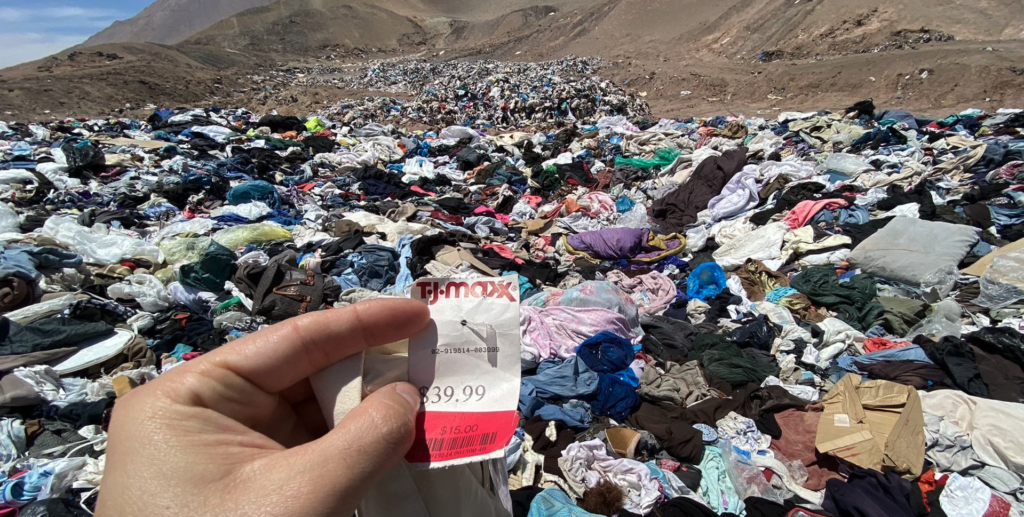
At Resortecs, we’ve conducted an LCA to compare the impact of different textile disassembly solutions (manual, mechanical, and Resortecs) coupled with (mechanical, chemical, and Purfi) textile recycling. Using all possible combinations of disassembly & recycling processes, we calculated the difference between the PEF of a circular pair of jeans and the PEF of a benchmark pair that would end up incinerated or in a landfill.
The results are not at all shocking: recycling is one of the golden opportunities to transform the future of fashion… but if not done right or, even worse, if disassembly is not part of the equation, the entire effort to make the textile supply chain greener could be wasted. Compared to incineration, the right technical choice, like adopting Resortecs to automate disassembly and facilitate industrial-scale recycling, can reduce CO2 emissions by up to 50%. The impact doesn’t stop there:
• water consumption can be reduced by 98%;
• textile waste can be decreased by up to 80%;
• costs linked to toxicity remediation can be reduced by over 200 euros (per pair of jeans!).
By now, you are probably wondering if brands will need to spend more to pick these low-hanging fruits? While the short answer is yes (no innovation is cheaper than the status quo before it becomes mainstream), the right answer is no!
Shifting from linear production to a circular model, such as the one made possible by Resortecs’ Smart Stitch™️ & Smart Disassembly™️, is a medium-term investment that has many financial advantages for different players along the textile supply chain. To list only the benefits for brands, adopting Resortecs allows fashion giants to:
• reduce their carbon footprint and avoid offsetting costs or CO2 taxation;
• secure a continuous stream of traceable, recycled, sustainable materials;
• save up to 15% in production costs;
• get an ROI as high as 300% with payback within the year;
• and, ultimately, reduce the consequences of fashion production on climate change!
What do you think – can numbers and LCAs eventually stop the fashion industry from destroying the planet? Let me know in the comments sections.
If you are curious to discover how the fashion industry can reduce its annual emissions by 204 M tons in the coming 10 years, download our externally-reviewed Life Cycle Assessment.
Resortecs’ innovation – the first of its kind – can process up to 1 ton of garments per day and is being tested by 30 major global fashion brands
Recently, images of the mountains of unsold clothing dumped in the Atacama Desert, in Chile, shocked the world. Each year, 34 million tonnes of textiles worth more than 400 billion euros are wasted by the fashion industry – which became a strategic target of the EU Green Deal. Behind these alarming figures are the costs and complexity of disassembly and recycling. When faced with stacks of unsold inventory, that might reach up to 40% of each season’s production, fashion brands turn to options easier and cheaper than recycling, such as landfills or incineration. If it’s up to Resortecs, however, this scenario is about to change.
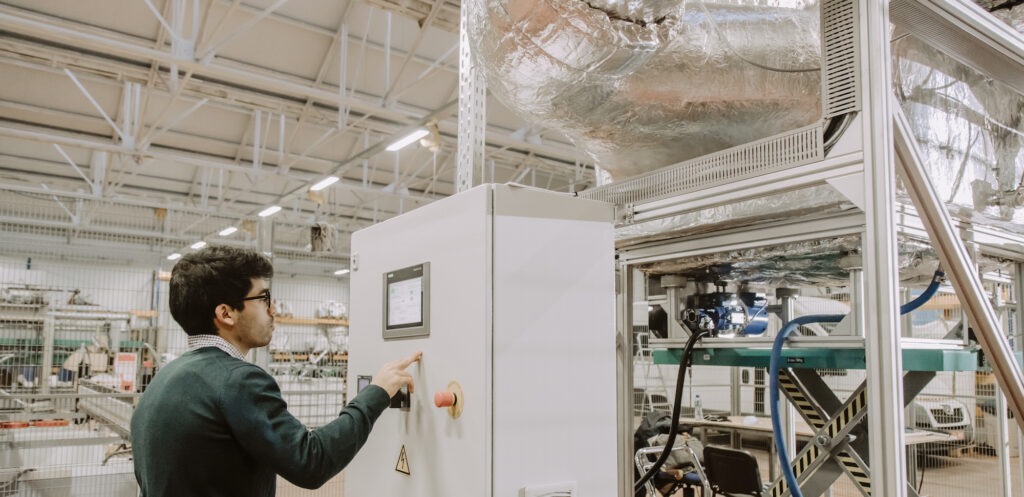
The start-up presents its first thermal disassembly system in a demonstration event for the press, politicians, investors, and industry peers in Brussels on Thursday, 09/12. The system combines heat and mechanical force to disassemble clothes stitched with Resortecs’ heat-dissolvable threads. Inside the system – a globally-patented, high-tech version of an industrial oven – the clothes are exposed to specific temperatures, making the seams disappear automatically and allowing for easy material sorting and recycling.
“The system works with little to no oxygen inside. This preserves the fabrics’ quality and prevents the clothes from burning, even when they are submitted to temperatures higher than 200° C”, explains William Allouche, Technical Lead for Disassembly and the mind behind the system’s engineering. “We’ve made sure to develop a closed-loop system to preserve the heat produced for each batch of clothes for the longest time possible. This ensures energy recovery and generates way less CO2 emissions than other heat-induced processes.”
The thermal process is 5x faster than traditional disassembly methods and enables the recycling of up to 90% of the original fabric material, instead of the usual 48% obtained after manual or mechanical disassembly. Using data to prove the impact of its innovation, Resortecs ran an externally-reviewed life-cycle assessment which shows that the process adoption could help the fashion industry cut its CO2 emissions by 50% and reduce waste generation by 80%. If the entire EU production were thermally disassembled and recycled, the fashion industry could generate 60.3 million fewer tons of CO2 and save up to € 2.3 billion per year.
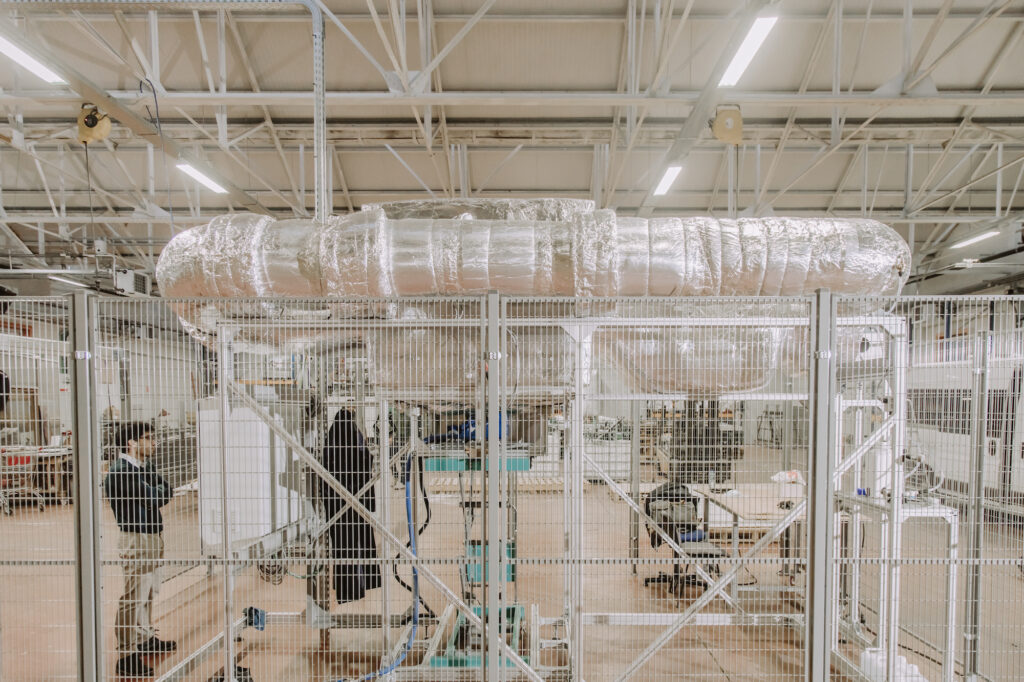
The version presented to the public is just a prototype. It can process up to 1 ton of textile per day and is being used to show first partners, such as the fast-fashion giant H&M and other 30 global fashion brands, how the start-up’s solution works. In the long term, it will be part of a network of thermal disassembly systems placed in recycling plants all over the world. The idea is to cover the globe with automatic thermal disassembly to speed up global textile recycling. Still in 2022, a second system with a larger processing capacity will come into operation. Together, both units will be able to prepare up to 13 tonnes/day of clothing for recycling, an unprecedented volume in the world.
“Everyone thinks of recycling, but no one looks at the biggest challenge to make it happen: disassembly. We saw an opportunity to optimize production while boosting up recyclability and sustainability, and we jumped on it” says founder Cédric Vanhoeck. “Brands have finally realized that there’s no way to continue producing and wasting textile as if nothing is happening with the planet. When we started 4 years ago, brands complained about the costs of sustainability, now they come to us because they understand that circularity is an investment.”
Join us.
Subscribe to our newsletter.
By subscribing, I agree with having my personal data stored and processed by Resortecs so I can receive future updates and marketing offers.
